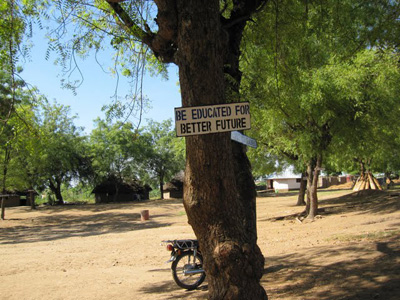
JUBA, Southern Sudan — “We can’t always judge a student as ‘traumatized,’” said Mother Jina, the headmistress of Usratuna Basic Education School, a Catholic primary school in Juba, the capital of southern Sudan. “But their behavior—active, quiet, stubborn—is sometimes difficult for teachers to deal with.” Mother Jina spoke to me about the students at her school who were orphaned during the devastating civil war between Sudan’s North and South, which ended in 2005 with the signing of the Comprehensive Peace Agreement.
Usratuna opened in 1989, when Juba was a garrison town for the North’s army, the Sudanese Armed Forces, or SAF. The school remained opened through the most brutal periods of the war, when U.N. planes attempting to bring relief supplies into Juba were shot at regularly by the southern army, or the SPLA, troops surrounding the town. Today, Usratuna has 1,000 students, and is known as one of the best primary schools in Juba.
Despite its strong reputation, the school faces many constraints such as overcrowded classes (between 50 and 85 students per class) and a dearth of resources—the school has no library, few textbooks, and Mother Jina lamented that it can be dangerous for the children to run around the open schoolyard because of soil erosion, poor irrigation, and large ditches in the school’s grounds.
Posted on trees in the schoolyard are wooden painted signs with messages to encourage and advise the students: “Pray Always,” “God Loves You,” “Do Your Homework,” “Don’t Cheat on Exams.” The most meaningful sign to me was one that spoke to the history of the place where these students come from: “Be Educated for a Better Future.”
At first glance, this sign is not out of the ordinary. It could appear on any poster printed by the U.N. or by a development or education organization supporting the message of education and empowerment in any number of countries. But the message struck me as particularly significant in this school in this part of the world. As Mother Jina said, many of her school’s students are clearly traumatized by the direct or indirect effects of the civil war, by decades of conflict and violence in southern Sudan. Even those children whose families fled the South during the war—and who were perhaps born in a refugee camp in neighboring Ethiopia, Uganda, or Congo, or in a hospital in Nairobi, Kenya, if they were lucky—are living with the reality of their country’s history. It is not an exaggeration or an insult to say that this history is tortured, painful, and traumatic. However, despite this history, and often even because of this struggle, the people of southern Sudan are also proud. They are hopeful for a better future and they are working towards it.
When I asked a southern army general recently how he felt about the challenges of the current, critical period in the run-up to the nationwide elections and southern self-determination referendum, he said, “A freedom fighter is always hopeful.” This hope is evident in the eyes of some people I have met in Juba, like Mother Jina, who works hard every day to make her school a safe and positive environment for her students. Sadly, some of her students’ young faces seem less hopeful. These children have already witnessed enough of war and its effects to lose hope. It may well take years of peace to change these faces and bring hope back into them.
A special thanks to Mother Jina for her assistance in editing this blog post.

